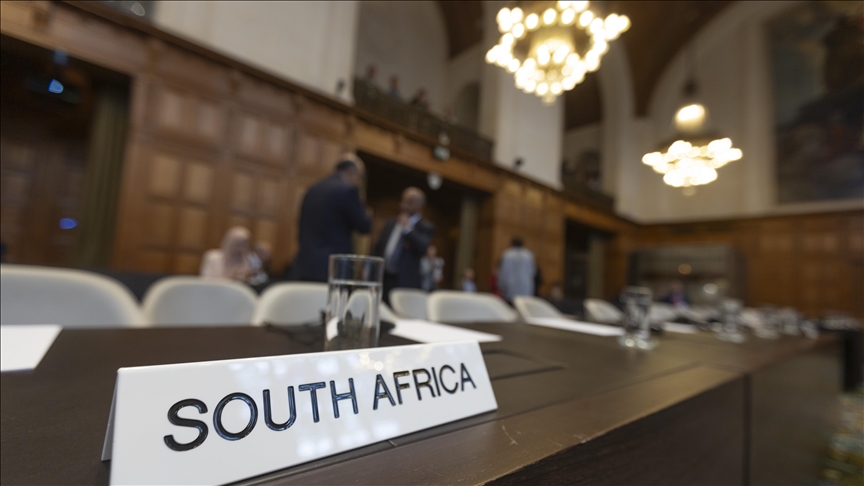South Africa’s genocide case against Israel strongest ever at ICJ, expert says
International law scholar William Schabas, from a Holocaust-survivor family, says Israel has gone from victim to perpetrator, committing crimes against humanity in occupied Palestine

- International law scholar William Schabas, from a Holocaust-survivor family, says Israel has gone from victim to perpetrator, committing crimes against humanity in occupied Palestine
- In comments to Anadolu, Schabas says nations backing Israel, including US and Germany, ignore evidence of genocide while applying tougher standards to other crises
ANKARA/ISTANBUL
South Africa’s genocide lawsuit against Israel is being described as the strongest ever filed before the International Court of Justice (ICJ), as Israel’s bombardment and blockade continue to drive Gaza deeper into humanitarian catastrophe.
Since Oct. 7, 2023, at least 64,718 Palestinians have been killed and 163,859 wounded in Israeli assaults. Starvation, thirst and a near-total collapse of medical supplies are threatening millions of displaced civilians crammed into makeshift shelters under constant risk of disease.
Experts argue Israel’s actions show “genocidal intent” under international law.
William Schabas, professor of international law at Middlesex University in the UK, told Anadolu that Israel’s actions amount to genocide and crimes against humanity. He cited disproportionate attacks on civilians, the use of hunger as a weapon of war, and violations of human rights.
Israel’s unlawful actions
Schabas said Israel’s presence in Gaza, the West Bank and East Jerusalem is unlawful, stressing that unlike the International Criminal Court, which prosecutes individuals, the ICJ holds states accountable under the Genocide Convention.
“(It's been) 77 years since the Genocide Convention was adopted, and there have now been about 20 cases that have come before the International Court of Justice over the years. That's about 10% of all of the cases that have come. The case by South Africa against Israel is the strongest,” he said.
-Precedents and distinctiveness
He cited Bosnia and Herzegovina’s and Croatia’s genocide cases against Serbia as key precedents. The ICJ ruled in 2007 that genocide occurred in Srebrenica, holding Serbia responsible for failing to prevent it.
“But of course, in the case of South Africa versus Israel, it's not really; there is an issue of Israel preventing genocide, because Israel is being charged with actually perpetrating genocide,” Schabas said.
Double standards
Schabas emphasized that Article 3 of the Genocide Convention also covers complicity. He recalled Nicaragua’s lawsuit against Germany in March 2024 over its military aid to Israel, saying Berlin accepted the court’s jurisdiction and therefore can be tried.
“So I don't think that there's any doubt that the US and Germany and others who have been helping Israel by supplying weapons, by providing other forms of support, financial support, political support, diplomatic support, that these states know what Israel is doing,” he said.
“They close their eyes and pretend that it cannot be genocide when we have a case where the evidence is so strong. The International Association of genocide scholars issued a declaration with a lot of evidence to support it, many sources confirming that genocide was being committed in Gaza.”
Schabas criticized countries such as Germany, Canada, the US, France, the Netherlands and Denmark for recognizing genocide in Myanmar while denying it in Gaza.
“If genocide is being committed in Myanmar, then surely it's been committed in Gaza, but they're in denial because they apply double standards,” he said.
Trump and complicity in Gaza
Schabas suggested that US President Donald Trump could be accused of complicity in war crimes, recalling his sanctions on ICC judges.
“In a way, it's flattering, because if Trump thinks that they are serious enough to do this, then it means that he takes seriously the authority of the International Criminal Court,” he said.
Arrest warrants and accountability
On arrest warrants against Israeli leaders, including Prime Minister Benjamin Netanyahu and former Defense Minister Yoav Gallant, Schabas said they were mostly symbolic because the chances of arrest are slim.
He argued that prosecuting Western leaders and businessmen complicit in genocide and war crimes would be more effective. Still, he noted that Netanyahu and Gallant risk detention if they travel to one of the ICC’s 125 member states.
Family history and moral weight
Schabas said the ICC has been examining Palestine for about 15 years and that the case is “now close to something real.”
He also shared that he comes from a Jewish family of Holocaust survivors.
“It raises moral issues. How can people who were victims of such terrible crimes then turn around and perpetrate them against others? But this is the world we live in. Human beings are complex,” he said.
Pointing out that many Jews have historically opposed Zionism and are disturbed by Israel's war crimes, Schabas added: "We don't want to be part of a project that involves stealing land from people and driving them out of their territory, and now killing them. Many Jews never wanted to be part of that at all."
Anadolu Agency website contains only a portion of the news stories offered to subscribers in the AA News Broadcasting System (HAS), and in summarized form. Please contact us for subscription options.







